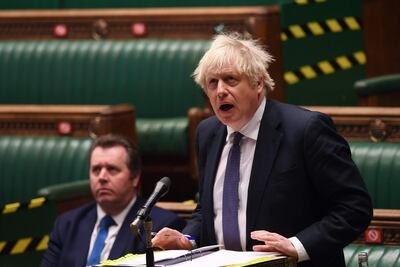UK Prime Minister Boris Johnson pledged that his government would use “every available second” to protect the elderly and vulnerable from the virus rampaging across Britain.
Mr Johnson on Wednesday addressed Parliament to explain why Britain had to return to a Covid-19 lockdown.
Members were recalled from their Christmas recess to discuss the measures, which came into force at midnight.
They are expected to approve England’s third national lockdown because there is a wide consensus on the need for tougher restrictions to control soaring new infections.
“When the Office for National Statistics reports that more than 2 per cent of the population is now infected, and when the number of patients in hospitals in England is now 40 per cent higher than the first peak in April, it is inescapable that the facts are changing and we must change our response,” Mr Johnson said.
“We will use every available second of the lockdown to place this invisible shield around the elderly and the vulnerable” until vaccination provides a “means of escape” from lockdown, he said.
The UK is in a storm of rising Covid-19 infections, hospital admissions and deaths.
Britain reported more than 60,000 new confirmed cases in 24 hours for the second day in a row on Wednesday.
Authorities said more than 403,914 people had tested positive in the past seven days, a 43 per cent increase from the previous week.
Rising infections are also putting an unprecedented strain on the nation’s healthcare system.
Hospitals in the UK are treating 30,451 coronavirus patients, 40 per cent more than during the pandemic’s first peak in April.
Authorities reported 1,041 deaths on Wednesday, the highest since April 21.
Hospitals are jammed with Covid-19 patients and medical personnel, many of whom are exhausted after months of dealing with the virus, find themselves stretched thin.
“We’ve got these unprecedented numbers of patients coming in with Covid,” said Dr Tom Dolphin, a member of the British Medical Association council who works in London.
“And we probably haven’t seen the peak yet from the patients coming in who got infected during Christmas and the new year period.”
When Mr Johnson on Monday announced the stay-at-home order and the nationwide closure of gyms, pubs, restaurants and non-essential shops, he said the restrictions would be in place until mid-February.
By that time, the government hopes to have given one dose of a Covid-19 vaccine to about 13 million people who are most at risk, including everyone in the country over age 70.
That could allow some relaxation of the restrictions.
“After the marathon of last year, we are indeed now in a sprint, a race to vaccinate the vulnerable faster than the virus can reach them, and every needle in every arm makes a difference,” Mr Johnson said.
There has been anger over the chaos in the government’s education strategy during the pandemic.
As part of the latest lockdown, Mr Johnson ordered schools across England to close, retreating on the government’s pledge to keep them open.
Some politicians are seeking assurances that schools will reopen in mid-February.
“It’s been a huge shambles,” Robert Halfon, chairman of the House of Commons’ education committee, told the BBC.
“This has got to stop. The government has got to offer consistency, a consistent policy that doesn’t change every couple of days.”
Education Secretary Gavin Williamson said the major exams for pupils aged 16 and 18, which determine their chances of tertiary education, will not be held this summer.
Mr Williamson said students would instead be graded based on teacher assessments.
Mr Johnson ordered the national lockdown in England after public health officials warned that the rising infection rates threatened to overwhelm the National Health Service.
On Tuesday, the Office for National Statistics estimated that 1 in 50 people in England was infected with Covid-19 in the week ending January 2.
The government is intensifying its mass vaccination programme after regulators authorised a second vaccine.
The UK is using the Pfizer-BioNTech vaccine and one made by the University of Oxford and AstraZeneca.
Both require two shots but British authorities decided to delay the second shot from 21 days after the first to up to 12 weeks later, to vaccinate as many people as quickly as possible.
The decision is being hotly debated by governments and scientists around the world.
As of Monday, the NHS had vaccinated 1.3 million people across the UK.
The government plans to have almost 1,000 vaccination centres operating across the country by the end of this week, Mr Johnson said.












